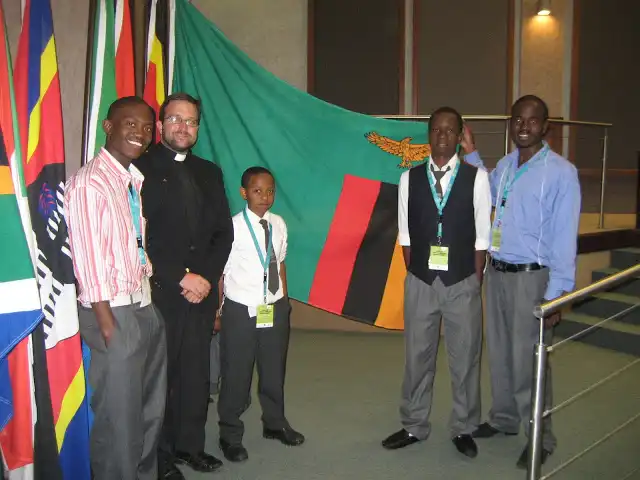I recently wrote an article in the Summer 2010 edition of Jesuits & Friends and I thought it might be worth posting here too… since I have been so bad at updating this blog.

Matthew Charlesworth SJ is serving his Regency in Canisius Secondary School in Chikuni, Zambia. Regency is a two to three year period between a Jesuit’s studies in Philosophy and Theology in which he is engaged in apostolic work. Matthew has been a House Master for the junior boarders and a Grade 8 Teacher, teaching Mathematics and Computer Science from Grade 8 to Grade 12. He writes: I see this work as creating a more just society because without Mathematics no tertiary level education is possible (read: no escape from poverty). Whilst I certainly do not succeed in every case, I do try to give the children a sense that Mathematics is not impossible, and in fact is rather useful and can on occasion be rather fun; and my work with computers helps bridge the digital-divide as even a basic introduction to Microsoft Word enables the children to seek some sort of office work as a typist after school. (Due to our frequent power-cuts we often spend the first few weeks practicing how to type on a piece of paper which has the keyboard drawn onto it). The children all study with a passion and literally ‘soak’ up any input. But they are not selfish! Some of them learn skills at the Radio Station by anchoring a radio show for children every Saturday morning; others demonstrate a great commitment to community service by spending their afternoons teaching younger children in neighbouring Basic Schools subjects such as English and Mathematics. One exciting highlight of my time here in Zambia has been my work with the Debating Society where last holidays we were invited to participate in the African Schools Debating Championships in Johannesburg. We were unable to afford to fly so we opted to take a 27-hour bus journey. This was a notable trip because it was the very first time the school had participated in an event outside of South Africa, and for many of the boys their first to see life outside of Zambia. The trip was a huge success – we came fourth overall and one of our speakers was ranked in the top 10. Chibwe Mbanga, the Deputy Head-boy and Chair of the Debating Society commented that he “would like to acknowledge the experience at the Apartheid Museum and the South African Constitutional Court which has taught me how important freedom is in one’s life and how all humans should be treated equally.” One of the amazing works in the Mission, apart from the schools, is the Radio Station which – in addition to the encouragement and broadcast of local talk shows, news and music – also broadcasts lessons to children & adults who are unable to attend normal schooling due either to the family situation, remoteness of their location, lack of funding or needs at home. Mentors in the outstations assist the children in the ‘class’ as they listen to the daily lesson on the radio. Such is the thirst for knowledge in Africa by children that despite the very difficult conditions these children have out-performed their counter-parts in other “proper” schools in the Grade 7 exams which precede entrance into the Secondary School. Some classes are simply a circle of children gathered under a tree listening to the radio; other communities have managed to work together to build a building for the school and where textbooks can be safely stored. This work of the Society and the enthusiasm and dedication of the children to doing everything they can to receive an education is awe-inspiring. Chikuni Jesuit Mission by numbers
- Approximate Population 25,000
- Basic Schools 21
- Boys High School 1
- Girls High School 1
- Teachers Training College 1
- Number of outstations for Mass Supply 21
- Parish area 10,000km2
- Small Christian Communities 180
- Radio School enrolment 1,500
- Radio School centres with 4 classes each 16
- Radio School mentors 64
In addition to the initiatives mentioned by Matthew, mention should also be made of the incredible work done by the staff at the hospital (where they have had to cope with 4,370 malaria cases in the last quarter and 1,800 people living with HIV, of which 1,200 currently receive anti-retrovirals) – and of their joint programmes with the Radio and Home-Based Care to offer holistic health-care; the volunteers at the Home-Based Care for people living with AIDS who help more than 1,725 clients in 180 of the villages in the three major surrounding districts; the 1,500 orphans who are sponsored and supported in surrounding schools; the work of the Mukanzubo Kalinda Institute & Museum who pass on the culture and protect the Tonga linguistic heritage through their research and publication of dictionaries and literature; and the work of the 180 small Christian communities scattered throughout the parish that meet, pray and serve together.